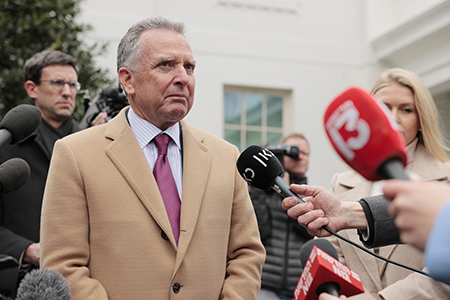Iran, U.S. Begin Nuclear Talks
May 2025
By Kelsey Davenport
The United States and Iran began discussions on a nuclear agreement, but Trump administration officials have sent mixed messages about U.S. objectives for a deal. Specifically, it is unclear if the United States will accept an agreement that allows Iran to continue to enrich uranium, an issue that Iran says is non-negotiable.

President Donald Trump told reporters that the United States and Iran would begin negotiations in Oman the following week during an April 6 meeting with Israeli Prime Minister Benjamin Netanyahu. The New York Times reported on April 16 that Trump told Netanyahu during the meeting that the United States would not support Israeli plans to strike Iran’s nuclear program in May. Trump told reporters on April 17 that he is not “in a rush” to attack and that Iran is “wanting to talk.”
Although both Trump and Iranian President Masoud Pezeshkian have expressed support for a nuclear deal, it is unclear if the two sides will be able to bridge the gaps and reach an agreement. Netanyahu also appears unlikely to support an agreement. He released a video statement on April 7 suggesting that Israel would support diplomacy with Iran, but an effective agreement must include completely dismantling Iran’s nuclear program under U.S. supervision.
The United States and Iran described the first meeting between U.S. Special Envoy to the Middle East Steve Witkoff and Iranian Foreign Minister Abbas Araghchi as constructive. Although the talks were indirect, Araghchi and Witkoff shook hands and spoke briefly.
After the meeting, Witkoff told Fox News April 14 that Iran could enrich uranium up to 3.67 percent uranium-235, a level suitable for nuclear reactor fuel. He also said a deal would focus on monitoring and prohibiting weaponization-related activities. The following day, however, Witkoff said on X that Iran must “eliminate its nuclear enrichment and weaponization program.”
Other senior Trump administration officials, including Secretary of State Marco Rubio and National Security Advisor Michael Waltz, also suggested Iran must give up uranium enrichment as part of an agreement.
Araghchi told Iranian media April 16 that the shifting U.S. position is “not helpful,” but he said Iran will look to the United States to make clear its “real position” during talks.
He said Iran’s nuclear enrichment program is intended to fuel nuclear power reactors and that Iran is willing to “build trust regarding potential concerns but the issue of enrichment is non-negotiable.”
In a transcript of a speech Araghchi intended to deliver April 21, he elaborated on Iran’s position, saying Tehran is “ready to engage” with Washington, but the basis for talks must include a “recognition of our rights” under the nuclear Nonproliferation Treaty (NPT), “including the ability to produce fuel for our nuclear power plants.”
The United States disagrees that the provision in the NPT that guarantees non-nuclear-weapon states access to nuclear technology under appropriate safeguards for peaceful purposes includes a right to enrich. However, the Obama administration’s acknowledgement that Iran could retain a limited uranium enrichment program was critical for advancing negotiations toward the interim nuclear deal in 2013 and later the 2015 deal, known as the Joint Comprehensive Plan of Action (JCPOA).
Under the JCPOA, Iran agreed to limit its uranium enrichment to a level suitable for reactor grades, 3.67 percent of U-235, the level Witkoff initially suggested the United States could support in a new deal.
Currently, Iran is enriching uranium up to 60 percent, U-235. Sixty percent enriched uranium is near-weapons grade and has no legitimate civilian purpose in Iran’s program.
Despite Witkoff backpedaling on the issue of uranium enrichment, Araghchi said the two parties moved forward during the second round of talks in Rome on April 19 and have a “better understanding of the goals.” He said that Iran is “seeking an agreement as quickly as possible” but noted it will not be easy.
Trump told reporters on Air Force One April 12 that the talks were going “okay” but “nothing matters until you get it done.”
International Atomic Energy Agency Director-General Rafael Mariano Grossi stressed the short timeframe available for talks during an April 15-16 meeting in Tehran. Grossi told reporters April 17 that IAEA verification of any deal is necessary to ensure its validity. He said the IAEA is in contact with the U.S. negotiating team to see how the agency can “help achieve a positive outcome in the negotiations.”
The IAEA has raised concerns in its quarterly reports on Iran’s nuclear program about the challenges of reconstituting credible baseline inventories in certain areas, such as centrifuges, since Iran reduced agency access and monitoring in February 2021.
Grossi said during the second round of talks in Rome in an April 19 X post that cooperation with the IAEA is “indispensable to provide credible assurances about the peaceful nature of Iran’s nuclear programme.”
